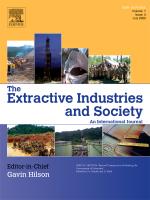Resistance to large-scale investment in Africa
Prior to the outbreak of COVID-19, large-scale investments in natural resources had increased dramatically in African countries. Projects were however often met with resistance by local populations who felt that their rights had been violated. Consequently, many projects never got implemented and investments that could have stimulated economic growth ended up leading to conflicts and political instability instead. In other words, government approval of investment projects was no guarantee of success.
Existing literature on large-scale investment has struggled to explain how projects can be implemented and rights accommodated at the same time. A new article in the Extractive Industries and Society, 'The politics of natural resource investments and rights in Africa: A theoretical approach’ argues that exchanges between local populations, ruling elites and investors are required. Whereas most other approaches focus on the relation between two groups of actors, the model thus points to a three-way relationship.
The article develops a model that identifies the importance of ‘reciprocal exchange deals’ between investors and local populations, ‘compatible interests’ between ruling elites and investors, and ‘mutual recognition’ between local populations and ruling elites. The article includes eight examples of mining, petroleum and agribusiness investments drawn from Mozambique, Tanzania and Uganda.
Co-authors of the article: Lars Buur, Roskilde University, Malin Nystran, University of Gothenburg, and José J. Macuane, Universidade Eduardo Mondlane.
DIIS Experts


